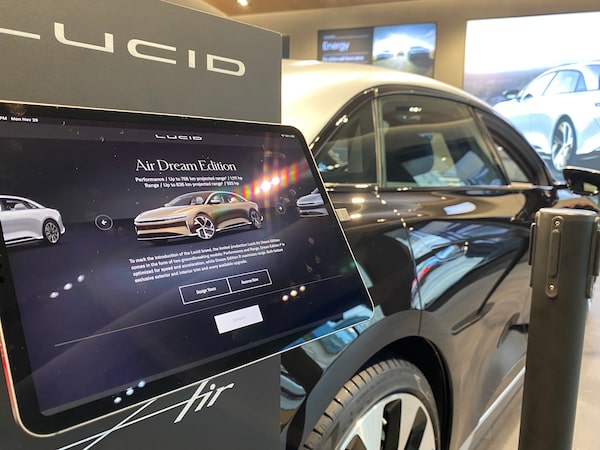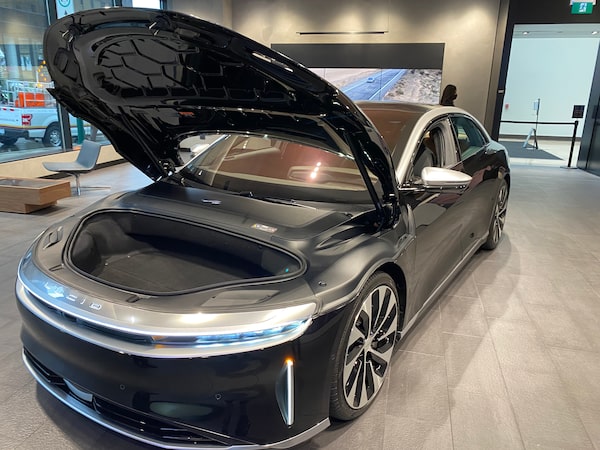
American EV startup Lucid Motors chose Vancouver for its first showroom outside the U.S.The Globe and Mail
Around the corner from an Apple Store and a few blocks from where Tesla closed its store in downtown Vancouver, there’s a new store selling one thing – a $189,000 electric sedan.
American EV startup Lucid Motors chose Vancouver for its first showroom outside the U.S. not only because the city has an eco-friendly reputation, but also has a large number of drivers who purchase $100,000-plus luxury gas guzzlers.
So does a pricey EV from a company new to building cars sound familiar? At the launch of Lucid’s Vancouver studio in October, sales executives initially avoided the T-word.
The company said it isn’t aiming to beat Tesla. Instead, it’s after the Germans.
“The goal is to try and move people out of traditional luxury cars – like Mercedes, BMW, Audi – into an electric vehicle,” said Dave Buchko, Lucid spokesperson. “Because, up until now, there really hasn’t been an EV that approaches the level of luxury that they’re used to.”
Lucid, which was founded in 2007 as an EV battery company called Atieva, finally started production of its Air sedan this fall after production delays during the COVID-19 pandemic.
It expects to ship 577 cars to U.S. customers this year, before ramping up production to 20,000 next year and 50,000 in 2023. It plans to start delivering cars to Canadian customers in early 2022.
There are four models with prices ranging from $105,000 for the Air Pure, which has 483 horsepower and a 653-km range, to $229,000 for the “very limited edition” Air Dream, which has 836-km of range and 933 horsepower.
To start, Lucid is only producing the $189,000 Grand Touring model, which has an 830-km range and 800 horsepower. It expects the whole lineup to be available next year.
Why start big?

Worldwide, Lucid has 17,000 reservations – which start at $400 for the Pure and $1,300 for the higher-priced models.Jason Tchir/The Globe and Mail
So why launch with such a pricey car?
Tesla’s sales didn’t really take off in Canada until it launched the relatively affordable Model 3 here in 2018.
“It’s just about making an impact and getting people to see what Lucid is capable of,” said Zak Edson, Lucid’s senior director of sales and service. “And, because we built a factory from the ground up in Arizona, you don’t want to start with a high volume of product – you want to sort of ease your way into it a bit.”
The higher-priced models have a higher profit margin which will help fund production, Edson said.
“Also, early adopters are often the ones who like the nicest version,” Edson said.
Since deliveries started, the company’s market value has soared, despite a U.S. Securities and Exchange Commission investigation into some of its projections.
Why do B.C. and Quebec get new EVs before other provinces?
Fisker plots 2023 return to Canada with affordable electric SUV
Lucid’s share price has fallen significantly in the past few weeks, but it’s valuation still sits around $60-billion. For comparison, Ford’s valuation is around $80-billion.
Worldwide, it has 17,000 reservations – which start at $400 for the Pure and $1,300 for the higher-priced models. Lucid didn’t have Canadian numbers available.
“So these aren’t just people clicking on ‘I’m interested,’” Edson said. “They have to get out their credit card or Apple Pay and allocate some funds.”
If you make a reservation, you’re not stuck buying a car. As they get closer to building your car, Lucid will contact you.
“When you say, go, then we’ll enter your car into the manufacturing system,” Edson said. “And then that reservation fee becomes non-refundable.”
Growing competition?

Lucid is looking at eventually producing smaller, cheaper models while staying 'in the luxury space.'The Globe and Mail
Lucid isn’t just facing competition from Tesla and traditional automakers.
“We are tracking more than a dozen new EV companies that are planning [or] hoping to launch in North America in the next three years,” said Andrew King, managing partner of DesRosiers Automotive Consultants. “Not all the new players will succeed obviously – but the scale of the number of new players in a short period of time is staggering.”
Companies launching new EVs include Fisker, Rivian, Faraday Future, Lordstown and VinFast.
In 2019, vacuum manufacturer Dyson cancelled its electric car after pumping US$850-million into the project.
Many of those startups are starting with an SUV or truck – the kinds of vehicles that the majority of North Americans like to buy.
“It’s an odd strategy to launch with a sedan in an SUV-intense market, but it didn’t stop Tesla when they launched,” said Robert Karwel, senior manager of automotive practice in Canada for J.D. Power, in an email. “The price points Lucid is describing would put them squarely into the luxury vehicles market in Canada, [competing] mainly with Tesla.”
Lucid’s also working on the Gravity, an SUV built on the same platform as the Air. While the company’s website said it’s “coming in 2023,” no launch date has been set.
The company is looking at eventually producing smaller, cheaper models while staying “in the luxury space.”
“Certainly we’ll have a more rounded product offering,” Edson said. “We’re also actively working with other [automakers] to look for ways that our technology can be used in lower-cost applications and higher volumes.”
The company can’t reveal which carmakers its working with, Edson said.
Living up to the hype?

Like Tesla, Lucid will primarily sell online. It plans more showrooms, including one in Toronto’s Yorkdale Mall early next year and another in Montreal.The Globe and Mail
The Tesla comparisons might be unavoidable.
Lucid CEO Peter Rawlinson, who joined the company in 2013, was VP of engineering at Tesla, where he launched the Tesla Model S.
Lucid has lessons to learn from Tesla’s missteps, which have included quality issues, complaints about customer service and overpromises about self-driving capabilities.
“Focus on customer treatment would probably go a long way here,” J.D. Power’s Karwel said.
Like Tesla, Lucid will primarily sell online. It plans more showrooms, including one in Toronto’s Yorkdale Mall early next year and another in Montreal.
While it will have service centres in Vancouver, Toronto and Montreal, it will also send technicians directly to owners.
Ultimately, though, despite the car’s power and range, consumers will need to be convinced that $189,000 is buying them quality.
While MotorTrend named the Air its 2022 Car of the Year, it said that “if Lucid fails to rectify the many wonky quirks our prototype suffered, the brand and car could go down in history as a 21st-century Tucker or Chevy Vega.”
While EV sales are expected to soar by the end of the decade, there’s plenty of room for EVs from startups and traditional carmakers – but success isn’t guaranteed, Karwel said.
“It’s still the wild-west when it comes to EVs,” Karwel said. “So there is lots of room for movement here, lots of room for success, but also room for blunders, too.”
Shopping for a new car? Check out the Globe Drive Build and Price Tool to see the latest discounts, rebates and rates on new cars, trucks and SUVs. Click here to get your price.